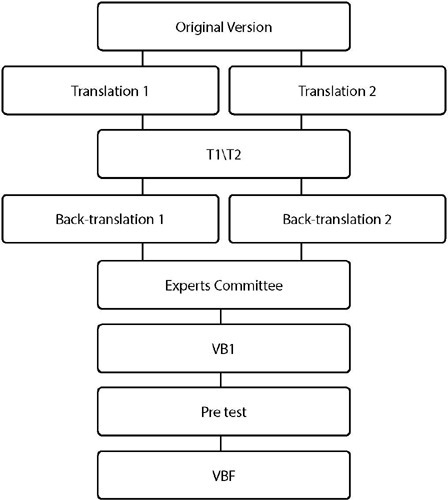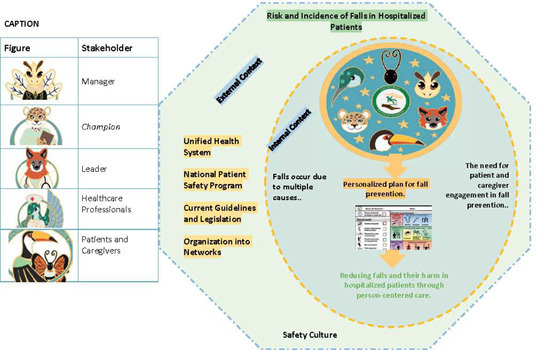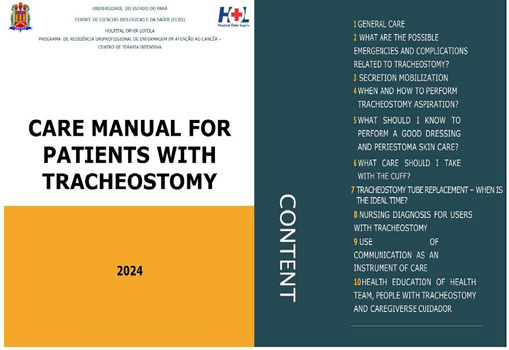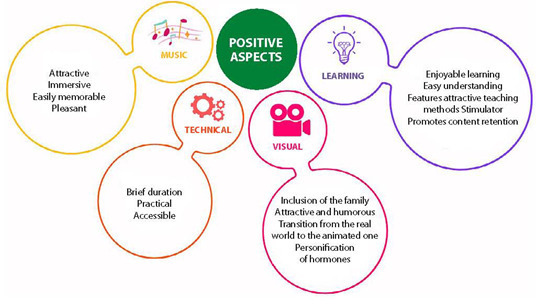-
LETTER TO THE EDITOR01-01-2017
Dimensioning the instrumentation: Exploratory or confirmatory factor analysis?
Revista Brasileira de Enfermagem. 2017;70(2):233-234
Abstract
LETTER TO THE EDITORDimensioning the instrumentation: Exploratory or confirmatory factor analysis?
Revista Brasileira de Enfermagem. 2017;70(2):233-234
-
EDITORIAL01-01-2017
Hepatites Virais: um desafio para enfermagem
Revista Brasileira de Enfermagem. 2017;70(2):231-232
Abstract
EDITORIALHepatites Virais: um desafio para enfermagem
Revista Brasileira de Enfermagem. 2017;70(2):231-232
DOI 10.1590/0034-7167.2017700201
Views0O século XX desvendou os mistérios sobre a etiologia das hepatites virais, identificando cinco agentes distintos responsáveis por essas viroses: vírus da hepatite A (HAV), vírus da hepatite B (HBV), vírus da hepatite C (HCV), vírus da hepatite D (HDV) e vírus da hepatite E (HEV). Esses vírus são responsáveis por um milhão de mortes […]See more -
EDITORIAL01-01-2017
Viral hepatitis: a challenge for nursing
Revista Brasileira de Enfermagem. 2017;70(2):231-232
Abstract
EDITORIALViral hepatitis: a challenge for nursing
Revista Brasileira de Enfermagem. 2017;70(2):231-232
DOI 10.1590/0034-7167.2017700201
Views0The 20th century unveiled the mystery of the etiology of viral hepatitis, with the identification of five different agents responsible for these infections: the hepatitis A virus (HAV), hepatitis B virus (HBV), hepatitis C virus (HCV), hepatitis D virus (HDV), and hepatitis E virus (HEV). These viruses account for one million deaths every year. HBV, […]See more -
ERRATUM01-01-2017
ERRATUM
Revista Brasileira de Enfermagem. 2017;70(1):242-242
Abstract
ERRATUMERRATUM
Revista Brasileira de Enfermagem. 2017;70(1):242-242
DOI 10.1590/0034-7167.20177001e01
Views0Article “Accessibility assessment of assistive technology for the hearing impaired”, with number of DOI: , published in the journal Revista Brasileira de Enfermagem, v69(5):781-7, page 781 that read:“Luciana Vieira de CaravalhoI”.[…]See more -
REVIEW01-01-2017
From silence to voice: book review
Revista Brasileira de Enfermagem. 2017;70(1):240-241
Abstract
REVIEWFrom silence to voice: book review
Revista Brasileira de Enfermagem. 2017;70(1):240-241
DOI 10.1590/0034-7167-2016-0066
Views1The book() is a translation of the original titled From silence to voice(), published by Cornell Paperbacks in 2006. Bernice Burech and Susanne Gordon are journalists and took the nursing profession as the object of study. The authors have diagnosed silence in the profession, which motivated writing a work valuing the use of all types […]See more -
REFLECTION01-01-2017
Reflections in the light of the complexity theory and nursing education
Revista Brasileira de Enfermagem. 2017;70(1):236-239
Abstract
REFLECTIONReflections in the light of the complexity theory and nursing education
Revista Brasileira de Enfermagem. 2017;70(1):236-239
DOI 10.1590/0034-7167-2016-0239
Views0See moreABSTRACT
Objective:
to reflect on nursing education, taking into account the principles of complex thinking proposed by Morin.
Method:
reflection based on the principles of the complexity theory by Edgar Morin.
Results:
the application of complexity in teaching proposes an emancipatory education based on questioning and social transformation. It comprises the education of nurses who interact with others as a characteristic of their work. It is necessary to prepare students to develop critical and reflective attitudes and actions to overcome the fragmentation and linearity of knowledge.
Conclusion:
nursing care has been based on a reductionist assistance, reflecting the Cartesian model. Thus, nursing education seeks to comprise shared knowledge and experiences so that no subject or professional overpowers another, accepting the uniqueness of professionals and patients.
-
EXPERIENCE REPORT01-01-2017
Pelvic floor rehabilitation program: report of 10 years of experience
Revista Brasileira de Enfermagem. 2017;70(1):231-235
Abstract
EXPERIENCE REPORTPelvic floor rehabilitation program: report of 10 years of experience
Revista Brasileira de Enfermagem. 2017;70(1):231-235
DOI 10.1590/0034-7167-2016-0257
Views0ABSTRACT
Objective:
to relate the creation, experience of establishment and service performed in the Pelvic Floor Rehabilitation Program [(PRAP)], a project of the School of Nursing of University of Campinas (UNICAMP), developed at a health unity in Campinas, São Paulo, Brazil.
Results:
this Program appeared due to the high demand of patients with urinary incontinence (UI) and need of formation or qualification of professionals to serve those customers and multiply the actions at other health unities. Nowadays, the PRAP is in its tenth year, and it has served 102 patients with UI and other dysfunctions of the pelvic floor and lower urinary tract, qualified 480 health professionals and stimulated researches.
Conclusion:
the preventive actions of pelvic floor rehabilitation are important areas of the nurse’s performance and initiatives as the related ones contribute for the professional formation and practice based on evidences.
Keywords:Lower Urinary Tract SymptomsNursingPelvic Floor DisordersRehabilitation ServicesUrinary IncontinenceSee more
-
RESEARCH01-01-2015
Symbolic effects capitalized by nurses from the National Institute of Cancer in Brazil (1980 – 1990)
Revista Brasileira de Enfermagem. 2015;68(2):284-290
Abstract
RESEARCHSymbolic effects capitalized by nurses from the National Institute of Cancer in Brazil (1980 – 1990)
Revista Brasileira de Enfermagem. 2015;68(2):284-290
DOI 10.1590/0034-7167.2015680214i
Views0See moreABSTRACT
Objective:
to describe the strategies of nurses in the National Institute of Cancer to disseminate its scientifi c capital and discuss the symbolic effects capitalized in the fi eld of oncology in the 1980s.
Method:
historical social studies, with primary sources consisting of written documents and oral reports, and as secondary sources, articles and books on the subject, based on the French sociologist Pierre Bourdieu’s concepts of scientifi c capital and habitus.
Results:
it revealed the effective performance of nurses in this Institute on policies of cancer prevention and control and strategies used in the teaching of oncology nursing at the undergraduate level. In conclusion, nursing stands out in this context, through the dissemination of its scientifi c knowledge, as a participant in the construction of a scientifi c fi eld of oncology nursing in Brazil, highlighting the occupation of important social areas.
-
RESEARCH01-01-2015
Perception of nursing undergraduate students on self-aging
Revista Brasileira de Enfermagem. 2015;68(2):278-283
Abstract
RESEARCHPerception of nursing undergraduate students on self-aging
Revista Brasileira de Enfermagem. 2015;68(2):278-283
DOI 10.1590/0034-7167.2015680213i
Views0See moreABSTRACT
Objective:
to analyze the perceptions of nursing undergraduate students on their self-aging process.
Method:
qualitative study carried out between August and September, 2011 with 18 nursing undergraduate students of a public university in Salvador, Bahia. The interviews were analyzed by means of the Content Analysis method.
Results:
the following thematic concept was apprehended: Perceptions of nursing undergraduates on their self-aging, which generated two subcategories: A) The “don’t think about it” process; B) The context infl uencing the process.
Conclusion:
undergraduates reveal that the aging process is an intrinsic factor to human development. Family ties, spirituality and physical activity would be key mechanisms toward active aging. However, students also reported that their accelerated and stressed social lifestyles led to inadequate habits, such as the consumption of fast food and alcohol, which become negative infl uences in their aging process.
-
RESEARCH01-01-2015
Non-conventional technologies for data collection in Brazilian dissertations and theses
Revista Brasileira de Enfermagem. 2015;68(2):269-277
Abstract
RESEARCHNon-conventional technologies for data collection in Brazilian dissertations and theses
Revista Brasileira de Enfermagem. 2015;68(2):269-277
DOI 10.1590/0034-7167.2015680212i
Views0See moreABSTRACT
Objective:
to characterize non-conventional technologies used for data collection of dissertations and theses available in the Catalog of Theses and Dissertations (CEPEn) of the Brazilian Nursing Association (ABEn).
Method:
this is a documentary research, whose data were collected in the catalogs of theses and dissertations available at the ABEn website, from Volumes XIX to XXI. The indicators collected were: academic level; educational institution; year; qualification of the author; setting; non-conventional technology used; type of technology; association with conventional techniques; methodological design; benefi ts and methodological limitations.
Results:
from a total of 6346 studies, only 121 (1.91%) used non-conventional technologies for data collection, representing the fi nal sample of the study.
Conclusion:
it is concluded that Brazilian Nursing researches still need methodological innovations for data collection.

-
RESEARCH01-01-2015
Content analysis of a technology to the nursing diagnostic reasoning
Revista Brasileira de Enfermagem. 2015;68(2):261-268
Abstract
RESEARCHContent analysis of a technology to the nursing diagnostic reasoning
Revista Brasileira de Enfermagem. 2015;68(2):261-268
DOI 10.1590/0034-7167.2015680211i
Views0See moreABSTRACT
Objective:
to undergo a content analysis of a metacognitive strategy of indirect assessment in the pre-encounter with the client.
Method:
methodological study. Agreement and inter-rater reliability index for the criteria: relevance, adequacy, clarity, conciseness and accuracy of a technology to the nursing diagnosis reasoning for novices through an electronic form. The sample consisted of 13 raters. Data were analyzed using descriptive statistics.
Results:
high agreement and inter-rater reliability for 85 items related to data collection stage and the strategy description. Only fi ve items did not reach the validation criteria and must be rewritten.
Conclusion:
indirect assessment of the pre-encounter is relevant to the diagnostic reasoning process, being possible to develop competencies and diagnostic skills in the novice through strategies, proposals on innovative technology in the form of a diagram.
-
RESEARCH01-01-2015
Manual for monitoring the quality of nursing home care records
Revista Brasileira de Enfermagem. 2015;68(2):253-260
Abstract
RESEARCHManual for monitoring the quality of nursing home care records
Revista Brasileira de Enfermagem. 2015;68(2):253-260
DOI 10.1590/0034-7167.2015680210i
Views0See moreABSTRACT
Objective:
to build and validate an instrument aimed at monitoring the quality of nursing records in the Home Care Program (HCP) of a university hospital.
Method:
methodological study involving the elaboration of a manual, whose content was later submitted to six experts for validation, reaching a ≥ 80% consensus. The data collection process was carried out in 2012 by means of a questionnaire comprised of the following issues: nursing evolution, nursing diagnosis, and nursing prescription, and standards for the nursing team recommended by the Regional Nursing Council of São Paulo and by the assessed institution. Manual items were judged according to the following variables: relevance, pertinence, clarity and simplicity.
Results:
of the 39 propositions, 100% achieved ≥ 80% agreement in the relevance, pertinence and clarity variables; 92.3% in the simplicity variable. Sleep/rest, Mobility and Check-out variables did not reach a favorable minimum consensus in the prescribed activities and were improved following suggestions from the experts.
Conclusion:
we believe that the instrument will enable the improvement of the HCP’s work process.
-
RESEARCH01-01-2015
Vulnerability of families of elderly citizens cared for by the Family Health Strategy
Revista Brasileira de Enfermagem. 2015;68(2):244-252
Abstract
RESEARCHVulnerability of families of elderly citizens cared for by the Family Health Strategy
Revista Brasileira de Enfermagem. 2015;68(2):244-252
DOI 10.1590/0034-7167.2015680209i
Views0See moreABSTRACT
Objective:
the present descriptive, exploratory, cross-sectional study aimed to identify the vulnerability of families of elderly citizens cared for by the Family Health Strategy (FHS).
Method:
the research employed home interviews and was developed with a sample of 500 families of aged people cared for by 32 FHS teams in the city of Dourados, MS, Brazil. The Family Development Index (FDI) was adapted in order to classify the families according to their degree of vulnerability.
Results:
the results revealed the presence of multigenerational families with low educational levels among individuals over the age of 20 and high illiteracy rates among elderly citizens. There were 403 families whose vulnerability was acceptable, 95 in severe vulnerability, and two families in a condition of very severe vulnerability. The most critical dimensions of the FDI were the access to knowledge and to work.
Conclusion:
the study identifi ed that there is still a need for further investments that can assist these aged people and their families in the Primary Health Care.
-
RESEARCH01-01-2015
The work in prison: reflections on the health of prison officers
Revista Brasileira de Enfermagem. 2015;68(2):235-243
Abstract
RESEARCHThe work in prison: reflections on the health of prison officers
Revista Brasileira de Enfermagem. 2015;68(2):235-243
DOI 10.1590/0034-7167.2015680208i
Views0See moreABSTRACT
Objective:
to understand the working conditions of prison offi cers and the repercutions of labor activity on their health.
Method:
qualitative and descriptive research. Data were collected through open interviews with the prison offi cers of a regional prision and the speeches were submitted to content analysis.
Results:
the results showed unsatisfactory working conditions due to poor material resources and neglect of governmental regarding rehabilitation of convicts, resulting in workers’ exposure to psychosocial risks, dissatisfaction, and emotional distress.
Conclusion:
investments on the security of workers may contribute to their health promotion.
-
RESEARCH01-01-2015
Mother recognition in the Neonatal Intensive Care Unit
Revista Brasileira de Enfermagem. 2015;68(2):228-234
Abstract
RESEARCHMother recognition in the Neonatal Intensive Care Unit
Revista Brasileira de Enfermagem. 2015;68(2):228-234
DOI 10.1590/0034-7167.2015680207i
Views0ABSTRACT
Objective:
analyze the maternal experience in a neonatal intensive care unit, focusing on relations of recognition.
Method:
a qualitative study, built on the perspective of Gadamer’s hermeneutics, based on Honneth’s concept of recognition. In-depth interviews were conducted with 10 mothers of children admitted to a neonatal intensive care unit.
Results:
failures were reported in the process of mother recognition in the unit, with consequent feelings of insecurity and obligation to child care, resulting in fragility of self-esteem.
Conclusion:
interactions with health professionals in the NICU and its standards and protocols cause vulnerabilities and affect maternal recognition and autonomy.
Keywords:Humanization of AssistanceIntegrality in HealthIntensive CareNeonatalProfessional-Family RelationsSee more
-
ORIGINAL ARTICLE06-14-2024
Duração e qualidade do sono da equipe de enfermagem brasileira que trabalha em turnos
Revista Brasileira de Enfermagem. 2024;77(2):e20230167
Abstract
ORIGINAL ARTICLEDuração e qualidade do sono da equipe de enfermagem brasileira que trabalha em turnos
Revista Brasileira de Enfermagem. 2024;77(2):e20230167
DOI 10.1590/0034-7167-2023-0167
Views0See moreRESUMEN
Objetivo:
analizar la duración y calidad del sueño en profesionales de enfermería que trabajan por turnos.
Método:
investigación analítica, transversal, realizada entre septiembre de 2017 y abril de 2018, en un hospital público del sur de Brasil, con el equipo de enfermería. Se utilizó el cuestionario sociolaboral y de síntomas de salud, la Escala de Somnolencia de Epworth y el Índice de Calidad del Sueño de Pittsburgh. Los datos se presentan como estadística descriptiva e inferencial, análisis bivariado y regresión logística binaria.
Resultados:
participaron 308 profesionales de enfermería, con predominio de sueño prolongado, ausencia de somnolencia y mala calidad del sueño. La duración corta del sueño (<6 h) se asoció con turnos de día y mala calidad del sueño. La calidad del sueño se asoció con la presencia de somnolencia diurna excesiva y con el trabajo diurno.
Conclusión:
los turnos de trabajo, el insomnio y la cefalea fueron los principales factores relacionados con la falta de sueño de los profesionales de enfermería. Los resultados pueden justificar el desarrollo de investigaciones de intervención para la salud de los trabajadores.
-
ORIGINAL ARTICLE06-14-2024
Sleep duration and quality of Brazilian nursing staff who work in shifts
Revista Brasileira de Enfermagem. 2024;77(2):e20230167
Abstract
ORIGINAL ARTICLESleep duration and quality of Brazilian nursing staff who work in shifts
Revista Brasileira de Enfermagem. 2024;77(2):e20230167
DOI 10.1590/0034-7167-2023-0167
Views0See moreABSTRACT
Objective:
to analyze sleep duration and sleep quality in nursing professionals who work in shifts.
Method:
this is a cross-sectional, analytical research, carried out between September 2017 and April 2018, at a public hospital in southern Brazil, with the nursing team. A socio-occupational and health symptoms questionnaire, the Epworth Sleepiness Scale, and the Pittsburgh Sleep Quality Index were used. Data are presented as descriptive and inferential statistics, bivariate analysis, and binary logistic regression.
Results:
participants were 308 nursing professionals with a predominance of long-term sleep, absence of drowsiness, and poor sleep quality. Short-term sleep (<6h) was associated with day shift and poor sleep quality. Sleep quality was associated with presence excessive daytime sleepiness and work day shift.
Conclusion:
work shift, insomnia and headache were the main factors related short-term sleep for nursing professionals. The results may justify the development of intervention research for workers’ health.
-
ORIGINAL ARTICLE06-14-2024
Translation and Cross-Cultural Adaptation of the LYMPH-ICF Instrument for Lymphedema into Portuguese/Brazil
Revista Brasileira de Enfermagem. 2024;77(2):e20230137
Abstract
ORIGINAL ARTICLETranslation and Cross-Cultural Adaptation of the LYMPH-ICF Instrument for Lymphedema into Portuguese/Brazil
Revista Brasileira de Enfermagem. 2024;77(2):e20230137
DOI 10.1590/0034-7167-2023-0137
Views0ABSTRACT
Objective:
The aim of this study is to cross-culturally adapt the Lymphoedema Functioning, Disability and Health Questionnaire Lymphoedema (LYMPH-ICF) instrument into Brazilian Portuguese and conduct a pilot application (n = 10), without psychometric pretensions.
Method:
Methodological research was conducted, following the steps of translation, synthesis, back-translation, and evaluation by the expert committee. Two translators, two back-translators, and twelve professionals participated in the expert committee. A pretest was carried out with 10 patients with secondary lymphedema due to breast cancer. The degree of agreement was determined by the content validity coefficient.
Results:
It was necessary to modify 8 out of the 29 questions comprising the questionnaire, which exhibited idiomatic disagreement. However, despite these changes, there were no indications of impairments, as content reliability was achieved through a validity coefficient of 0.90.
Final Considerations:
The instrument was successfully translated and cross-culturally adapted for Brazil with a high level of agreement.
Keywords:Breast NeoplasmsHealth CareInternational Classification of Functioning, Disabiliy and HealthLymphedemaPatient Health QuestionnaireSee more
-
ORIGINAL ARTICLE05-27-2024
Fall Tailoring Interventions for Patient Safety Brazil Program: an evaluability study in a teaching hospital
Revista Brasileira de Enfermagem. 2024;77(2):e20230348
Abstract
ORIGINAL ARTICLEFall Tailoring Interventions for Patient Safety Brazil Program: an evaluability study in a teaching hospital
Revista Brasileira de Enfermagem. 2024;77(2):e20230348
DOI 10.1590/0034-7167-2023-0348
Views0See moreABSTRACT
Objectives:
to present the theoretical model, logic model, and the analysis and judgment matrix of the Fall TIPS Brazil Program.
Methods:
a qualitative, participatory research approach, in the form of an evaluability study, encompassing the phases (1) problem analysis; (2) program design, development, and adaptation to the Brazilian context; (3) program dissemination. Data were collected through document analysis and workshops.
Results:
through document analysis, workshops with stakeholders from the participating institution, and validation with key informants, it was possible to identify the program’s objectives, expected outcomes, and the target audience. This allowed the construction of theoretical and logic models and, through evaluative questions, the identification of indicators for the evaluation of the Fall TIPS Brazil Program.
Final Considerations:
this study has provided insights into the Fall TIPS program, the topic of hospital fall prevention, and the proposed models and indicators can be employed in the implementation and future evaluative processes of the program.

-
ORIGINAL ARTICLE05-27-2024
Nursing care protocol for critical users with tracheostomy under mechanical ventilation
Revista Brasileira de Enfermagem. 2024;77(2):e20230337
Abstract
ORIGINAL ARTICLENursing care protocol for critical users with tracheostomy under mechanical ventilation
Revista Brasileira de Enfermagem. 2024;77(2):e20230337
DOI 10.1590/0034-7167-2023-0337
Views0See moreABSTRACT
Objectives:
to develop and assess a nursing care protocol for critically ill users with tracheostomy under mechanical ventilation.
Methods:
a methodological study, developed through two phases, guided by the 5W2H management tool: I) target audience characterization and II) technology development.
Results:
thirty-four nursing professionals participated in this study, who presented educational demands in relation to care for critical users with tracheostomy, with an emphasis on standardizing care through a protocol and carrying out continuing education.
Final Considerations:
the creation and validity of new technologies aimed at this purpose enhanced the participation of nursing professionals and their empowerment in the health institution’s microsectoral actions and in macrosectoral actions, highlighting the need for public policies that guarantee the conduct of a line of care for users with tracheostomy.

-
ORIGINAL ARTICLE05-27-2024
Assessment of educational technology in lactation physiology by health students
Revista Brasileira de Enfermagem. 2024;77(2):e20230252
Abstract
ORIGINAL ARTICLEAssessment of educational technology in lactation physiology by health students
Revista Brasileira de Enfermagem. 2024;77(2):e20230252
DOI 10.1590/0034-7167-2023-0252
Views0ABSTRACT
Objectives:
to assess the suitability, facilitators, and barriers of using a video clip for teaching lactation physiology to health students.
Methods:
a cross-sectional study was conducted with online data collection at a higher education institution, using the Assistive Technology Assessment Instrument and open-ended questions. The sample consisted of 88 students.
Results:
the video clip was deemed suitable in all attributes. Facilitators identified included attractiveness, musicality, and ease of access. Barriers noted were the music’s speed and the necessity for prior knowledge. The video clip achieved adequate scores for interactivity (1.71), purpose (1.77), relevance (1.64), and clarity (1.77). The overall average of the attributes was 1.72.
Conclusions:
the video clip can serve as an effective learning strategy to enhance hybrid education, potentially contributing to the promotion and support of breastfeeding. However, some barriers underscore the importance of prior knowledge for a complete understanding of the content.
Keywords:Biomedical Technology AssessmentEducational TechnologyHealth Sciences StudentsNursingTranslational Biomedical SciencesSee more
-
ORIGINAL ARTICLE05-27-2024
Technology for nursing care in a Maternal Intensive Care Unit: a methodological study
Revista Brasileira de Enfermagem. 2024;77(2):e20230202
Abstract
ORIGINAL ARTICLETechnology for nursing care in a Maternal Intensive Care Unit: a methodological study
Revista Brasileira de Enfermagem. 2024;77(2):e20230202
DOI 10.1590/0034-7167-2023-0202
Views0See moreABSTRACT
Objectives:
to develop and validate a nursing care plan in a Maternal Intensive Care Unit.
Methods:
a methodological study, developed in stages: integrative review; Nursing History construction; care plan restructuring; appearance and content validity by judges.
Results:
the history was organized into sections: Identification; Basic Human Needs; Physical Examination; and Assessment of Basic Human Needs. A care plan was restructured with 34 diagnoses, organized according to basic human needs. A satisfactory level of appearance validity of the history and care plan was obtained (Concordance Index varying between 86.3 and 100 for both instruments), and content validity with average indexes of 90.8 and 92.8, respectively. Thirty-four diagnoses, their interventions and nursing actions were consolidated.
Conclusions:
the instruments were considered relevant and pertinent in terms of appearance and content, and their use in the institution under study as well as in other similar services may be recommended.
-
EDITORIAL05-13-2024
Metodologia qualitativa: considerações e singularidades sobre a implementação de intervenções centradas na pessoa
Revista Brasileira de Enfermagem. 2024;77(3):e770301
Abstract
EDITORIALMetodologia qualitativa: considerações e singularidades sobre a implementação de intervenções centradas na pessoa
Revista Brasileira de Enfermagem. 2024;77(3):e770301
DOI 10.1590/0034-7167.2024770301pt
Views0A investigação qualitativa em saúde permite a compreensão aprofundada de como a pessoa experiencia as diferentes transições de saúde, a relação com os profissionais de saúde e a passagem pelos diferentes ambientes de prática clínica. Concomitantemente, tem o potencial de suportar a tomada de decisão clínica dos profissionais e de empoderar o cidadão na sua […]See more
Search
Search in:
Nuvem de Tags
Aged (144) Atenção Primária à Saúde (239) COVID-19 (104) Cuidados de Enfermagem (269) Educação em Enfermagem (151) Educação em Saúde (139) Enfermagem (930) Estudos de Validação (131) Health Education (144) Idoso (208) Mental Health (149) Nursing (987) Nursing Care (306) Patient Safety (151) Primary Health Care (284) Qualidade de Vida (104) Quality of Life (106) Saúde Mental (145) Segurança do Paciente (150) Validation Studies (108)



